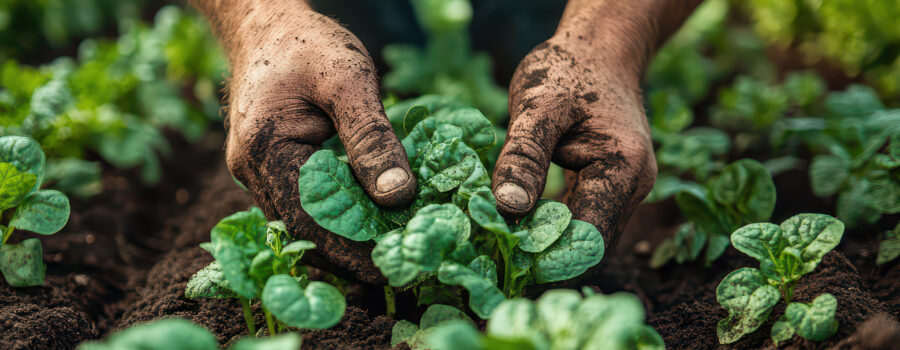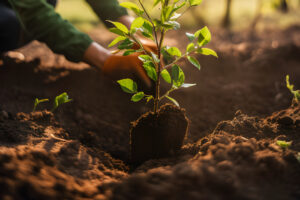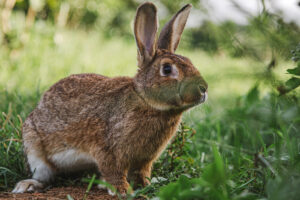When we talk about health, we often focus on things like diet, exercise, and stress management. But a key piece of the puzzle is the microbiome — the vast community of microbes that live in and on our bodies, especially in our gut. These microscopic allies influence everything from digestion and immunity to mental clarity and mood.
Our gardens can be an important part of supporting our microbiome, especially if we’re practicing permaculture — a holistic, regenerative approach to growing food and living in harmony with nature. There are fascinating connections between organic gardening and the microbiome.
What Is the Microbiome and Why Does It Matter?
Our microbiomes are made up of trillions of bacteria, viruses, fungi, and other microorganisms. Most reside in the digestive tract, where they:
- Help break down food
- Synthesize essential vitamins
- Regulate the immune system
- Protect against pathogens
- Influence brain chemistry through the gut-brain axis
A diverse and balanced microbiome is essential for health. But modern lifestyles, including processed foods, pesticides, over-sanitization, and antibiotics, have led to a decline in microbial diversity, contributing to everything from autoimmune diseases and allergies to anxiety and depression.
Rebuilding the microbiome starts with our environment and diet, and permaculture can play a major role in this process.
A Timeless Truth: “All Disease Begins in the Gut”
More than 2,000 years ago, Hippocrates declared that health begins in the gut. Today, modern science is finally catching up. Researchers are confirming what natural healers have known for centuries: that our digestive systems are the foundation of our physical, mental, and emotional health.
Many aspects of our modern lives disrupt our gut microbiome: antibacterial soaps and hand sanitizers, antibiotics, preservatives in processed foods, environmental toxins like glyphosate, heavy metals, air pollution, and microplastics. Yikes!
The path to gut healing isn’t just found in probiotics, but in the soil and on the fruits and veggies we snack on while we garden. Permaculture offers a timeless, nature-based way to restore the balance that Hippocrates spoke of — not just within ourselves, but in the ecosystems we rely on.
My herbalist mentor emphasized that we “live and die on a cellular level.” My integrative doctor was always encouraging me to get my hands in the soil. Permaculture doesn’t just feed our bodies, it supports the very building blocks of our being. The choices we make in our gardens ripple down to our very DNA.

Healthy soil and a healthy gut have a lot in common. They are both teeming with microbial life, and are:
- Dependent on diversity for resilience
- Disrupted by chemicals and monocultures
- Healed through organic matter and ecological balance
In fact, scientists often refer to the soil as the “external microbiome.” Just as a rich gut microbiome supports human health, a living soil microbiome supports plant health as well as the health of those who consume the plants.
When you practice permaculture, you’re not just growing food; you’re cultivating microbial diversity from the ground up, which can support your inner ecosystem.
1. Permaculture Builds Living Soil
One of the first principles of permaculture is “observe and interact,” with a strong emphasis on soil health. Permaculture gardeners:
- Avoid synthetic fertilizers and pesticides
- Use compost, mulch, and cover crops
- Encourage soil fungi like mycorrhizae
- Build hugelkultur beds or lasagna gardens to nurture life below ground
Healthy, organic soil teems with beneficial bacteria and fungi that are similar to those found in the human gut. When we garden barefoot, eat freshly harvested veggies, or even breathe in the scent of soil (thanks to important decomposers called actinobacteria), we’re engaging in microbial exchange that may help diversify our own microbiome.

2. Gardening Increases Microbial Exposure
We now know that exposure to diverse microbes throughout our lives helps train the immune system and protect against chronic illness. Permaculture and tending our food forests encourage:
- Hands-on contact with soil, mulch, compost, and plants
- Time outdoors in natural, biodiverse environments
- Interacting with animals, insects, and natural cycles
Research shows that gardeners have greater microbial diversity on their skin and in their guts compared to non-gardeners. So whether you’re weeding, planting, or harvesting, you’re repairing your body with beneficial microbes. And all that snacking we do in the garden is so good for us!
One study found that “a daily gardening routine with repeated and extended contact with soil likely reinoculates the skin such that soil microbes are often present, holding potential to impact health.”

3. Eating Fresh, Diverse, Organic Produce
The food we grow in our food forests isn’t just more nutritious — it’s microbiome-friendly in so many ways:
- Unwashed garden veggies often contain beneficial soil microbes (justifying our garden snacks!)
- Diverse crops support gut diversity through fiber and phytochemicals
- Plants like purslane, dandelion, and yarrow contain prebiotics and bitter compounds that stimulate digestion
- Fresh herbs like mint, oregano, and rosemary have antimicrobial effects that support a healthy microbial balance
By eliminating pesticides and harvesting produce right before eating, we’re consuming food that’s alive, whole, and microbiologically rich, which feeds our inner ecosystems.

4. Fermenting the Harvest
Fermentation is a key microbiome support strategy. In the process of preserving our harvest, we can also preserve or promote our gut health. Make sure to incorporate these foods into your diet on a regular basis:
- Sauerkraut
- Kimchi
- Kombucha
- Fermented pickles
- Sourdough
- Yogurt or kefir from homegrown herbs and dairy
When we ferment produce from our gardens, we’re cultivating beneficial bacteria like Lactobacillus and Bifidobacteria that directly boost our gut health. Plus, fermentation extends the harvest, reduces food waste, and aligns with permaculture principles of resilience and zero waste.
5. Permaculture Reduces Environmental Toxins
Chemical exposure is major threat to both soil and gut microbiomes. Conventional agriculture relies heavily on:
- Pesticides
- Herbicides (especially glyphosate)
- Fungicides
- Synthetic fertilizers
These chemicals kill beneficial microbes in the soil and in your body. Glyphosate (found in weed killers like Roundup) is known to alter gut bacteria which eventually leads to leaky gut and inflammation.
By eliminating these toxins, we’re creating a cleaner, safer food system. When we grow organically or buy from local regenerative farmers, we reduce our toxic load and allow our bodies a chance to thrive.
6. Connection to Nature Lowers Stress and Boosts Microbiome Health
Permaculture isn’t just about food — it’s about reconnecting to natural rhythms. That connection is healing in and of itself.
Chronic stress can damage the gut lining, reduce microbial diversity, and lead to conditions like IBS, depression, and autoimmune disorders. Gardening, especially in a permaculture system, is proven to:
- Lower cortisol levels
- Reduce anxiety and depression
- Encourage mindfulness and presence
- Increase serotonin (linked to contact with soil microbes)
A relaxed, joyful nervous system creates the ideal internal environment for gut microbes to flourish. And many gardeners believe that digging in the dirt feels therapeutic, which science now backs up.
7. Community, Culture, and Microbiome Sharing
In permaculture communities, food is shared, seeds are swapped, ferments are traded, and meals are prepared together — all offering opportunities for microbiome enrichment.
Humans historically shared microbiota through:
- Physical touch
- Shared food and tools
- Proximity to animals and nature
- Communal child-rearing
Modern isolation has led to reduced microbial exposure, but permaculture encourages reconnection with land, people, and life itself.
How to Start Supporting Your Microbiome
Even small steps make a difference. Here’s how you can begin:
- Grow a few herbs or greens in compost-rich soil
- Skip the pesticides — go organic and natural
- Add mulch and compost to feed your soil
- Get your hands dirty in healthy soil
- Harvest and eat fresh, diverse produce regularly
- Try fermenting your own pickles or kraut
- Spend time outside daily, breathing deeply
- Build or join a community garden or permaculture meetup
The more time you spend in a living landscape, the more your internal ecosystem will thrive too.
Final Thoughts
Your body is part of a larger ecosystem. Permaculture recognizes this deep connection, offering not only practical tools for food production but a path toward regenerating both soil and self. By tending the earth with care, we create a ripple effect that nurtures biodiversity above and below ground, including the microbial allies that support our health, immunity, mood, and vitality.
Your microbiome isn’t just affected by what you eat, it’s transformed by how you live. And permaculture is a beautiful, abundant way to live in balance with the microbial world.
Copyright © 2025 Fruitful Food Forestry & Lauren Lynch. No portion of the original content on this website may be reproduced, in any language, without express written consent.
Want a fun way to express your gardening style?
Check out what we’re “petaling”…









2 Comments
Leave your reply.